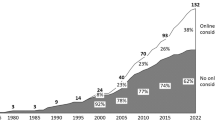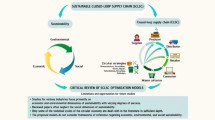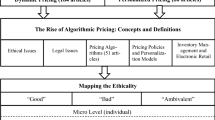Abstract
Iterative Multi-unit Combinatorial Auctions are auctions in which: bidders can express bids in successive rounds until a stopping rule is held; there are multiple units of each item; and bids are bundles of items. Data Envelopment Analysis (DEA) is a nonparametric method for measuring the relative efficiency of a set of homogeneous units. In this work, we present an algorithm for solving an iterative multi-unit combinatorial auction in which the auctioneer computes at each round a linear anonymous price for each item by using a DEA model and pushes bidders to express bids according to them. A computational study is carried out in order to check the performance of the proposed design.
Similar content being viewed by others
References
Anderson A, Tenhnen M, Ygge F (2000) Integer programming for combinatorial auction winner determination. In: Proceedings of the fourth international conference on multiagent systems, Boston, MA
Ausubel L, Milgrom P (2002) Ascending auctions with package bidding. Front Theor Econ 1(1), www.bepress.com
Banker R (1980) A game theoretic approach to measuring efficiency. Eur J Oper Res 5(4):262–268
Banker RD, Charnes A, Cooper WW, Clarke R (1989) Constrained game formulations and interpretations for data envelopment analysis. Eur J Oper Res 40(3):299–308
Bikhchandani S, Ostroy JM (2006) From the assignment model to combinatorial auctions. In: Cramton P, Shoham Y, Steinberg R (eds) Combinatorial auctions. MIT Press, Cambridge
Bichler M, Shabalin P, Pikovsky A (2007) A computational analysis of linear price iterative combinatorial auction formats. INFORMS Inf Syst Res (to appear), http://ibis.in.tum.de/staff/bichler/
Bogetoft P, Nielsen K (2002) DEA based yardstick competition in natural resource management. In: Finn H, Niels S, Lars W (eds) Recent accomplishments in applied forest economics research. Kluwer Academic, Dordrecht
Bogetoft P, Nielsen K (2008) DEA based auctions. Eur J Oper Res 184(2):685–700
Bogetoft P, Boye K, Neergaard-Petersen H, Nielsen K (2007) Reallocating sugar beat contracts: can sugar production survive in Denmark? Eur Rev Agric Econ 34(1):1–20
Caplice C, Sheffi Y, (2006) Combinatorial auctions for truckload transportation. In: Cramton, Shoham, Steinberg (eds) Combinational auctions. MIT Press, Cambridge
Charnes A, Cooper WW, Rhodes E (1978) Measuring the efficiency of decision making units. Eur J Oper Res 2(6):429–444
Che YK (1993) Design competition through multidimensional auctions. RAND J Econ 24(4):668–680
Cooper WW, Seiford LM, Tone K (2000) Data envelopment analysis: a comprehensive text with models, applications, references and dea-solver software. Kluwer Academic, Dordrecht
Cramton P, Shoham Y, Steinberg R (2006) Combinatorial auctions. In: Cramton, Shoham, Steinberg (eds) Combinational auctions. MIT Press, Cambridge
Cybernomics (2000) An experimental comparison of the simultaneous multiple round auctions and the CRA combinatorial auction. Technical report, report of the Federal Communications Commission, FCC, Washington, DC
De Vries S, Vohra R (2003) Combinatorial auctions: a survey. INFORMS J Comput 15(3):284–309
De Vries S, Schummer J, Vohra R (2007) On ascending Vickrey auctions for heterogeneous objects. J Econ Theory 127(1):95–118
Gonen R, Lehmann D (2000) Optimal solutions for multi-unit combinatorial auctions: branch and bound heuristics. In: ACM conf on electronic commerce (EC-00), Minneapolis, MN, pp 13–20
Jones JL, Koehler GJ (2002) Combinatorial auctions using rule-based bids. Decis Support Syst 34:54–74
Kelso AS, Crawford VP (1982) Job matching, coalition formation, and gross substitute. Econometrica 50:1483–1504
Kwasnica A, Ledyard J, Porter D, DeMartini C (2005) A new and improved design for multiobject iterative auctions. Manag Sci 51(3):419–434
Latacz-Lohmann U, Schilizzi S (2005) Auctions for conservation contracts: a review of the theoretical and empirical literature. Report to the Scottish environment and rural affairs department, October
Leskelä RL, Teich J, Wallenius H, Wallenius J (2007) Decision support for multi-unit combinatorial bundle auctions. Decis Support Syst 43(2):420–434
Leyton-Brown K, Shoham Y, Tennenholtz M (2000a) An algorithm for multi-unit combinatorial auction. In: Proc of the seventeenth national conf on artificial intelligence and twelfth conference on innovative applications of artificial intelligence, Austin, TX, pp 56–61
Leyton-Brown K, Pearson M, Shoham Y (2000b) Towards a universal test suite for combinatorial auction algorithms. In: Proc ACM conf on electronic commerce, Minneapolis, pp 66–76
Parkes D, Ungar L (2002) An ascending-price generalized Vickrey auction. In: Stanford institute for theoretical economics (SITE) summer workshop: the economics of the Internet. http://www.eecs.harvard.edu/~parkes/pubs/iBEA.pdf
Pikovsky A, Bichler M (2005) Information feedback in iterative combinatorial auctions. Conference proceedings, Wirtschaftsinformatik 2005, Bamberg, Germany. Springer, pp 331–350
Porter D, Rassenti S, Roopnarine A, Smith V (2003) Combinatorial auction design. In: Proc of the national academy of sciences of the United States of America
Sandholm T, Suri S, Gilpin A, Levine D (2002) Winner determination in combinatorial auction generalizations. In: AAMAS, Italy, pp 69–76
Sandholm T, Suri S, Gilpin A, Levine D (2005) CABOB: A fast optimal algorithm for winner determination in combinatorial auctions. Manag Sci 51:374–390
Thanassoulis E (2001) Introduction to the theory and application of data envelopment analysis: a foundation text with integrated software. Kluwer Academic, Dordrecht
Author information
Authors and Affiliations
Corresponding author
Rights and permissions
About this article
Cite this article
Aparicio, J., Landete, M., Monge, J.F. et al. A new pricing scheme based on DEA for iterative multi-unit combinatorial auctions. TOP 16, 319–344 (2008). https://doi.org/10.1007/s11750-008-0053-4
Received:
Accepted:
Published:
Issue Date:
DOI: https://doi.org/10.1007/s11750-008-0053-4
Keywords
- DEA efficiency
- Winner-determination algorithm
- Auction design
- Combinatorial auction
- Iterative multi-unit auction




